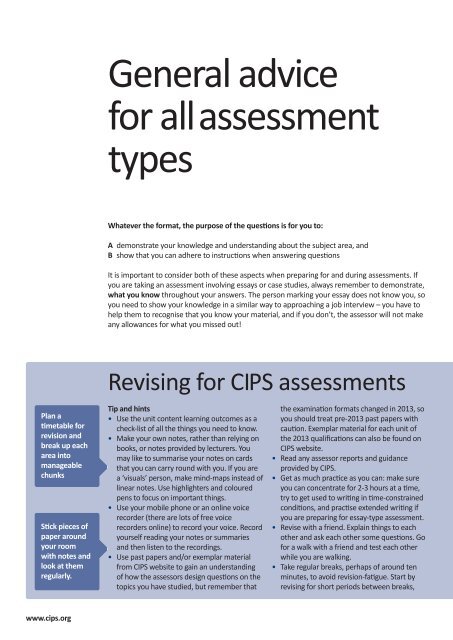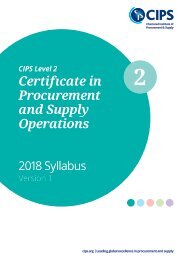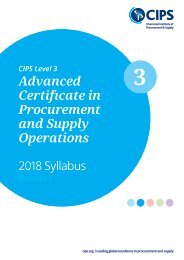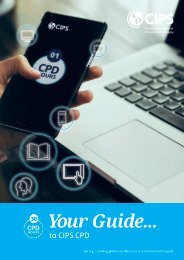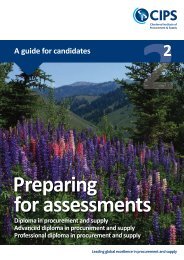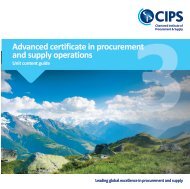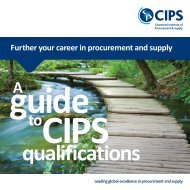Preparing for CIPS Certificate level assessments
Create successful ePaper yourself
Turn your PDF publications into a flip-book with our unique Google optimized e-Paper software.
General advice<br />
<strong>for</strong> allassessment<br />
types<br />
Whatever the <strong>for</strong>mat, the purpose of the questions is <strong>for</strong> you to:<br />
A demonstrate your knowledge and understanding about the subject area, and<br />
B show that you can adhere to instructions when answering questions<br />
It is important to consider both of these aspects when preparing <strong>for</strong> and during <strong>assessments</strong>. If<br />
you are taking an assessment involving essays or case studies, always remember to demonstrate,<br />
what you know throughout your answers. The person marking your essay does not know you, so<br />
you need to show your knowledge in a similar way to approaching a job interview – you have to<br />
help them to recognise that you know your material, and if you don’t, the assessor will not make<br />
any allowances <strong>for</strong> what you missed out!<br />
Memory aids <strong>for</strong> revision, and to improve recall during the exam:<br />
1 Many people claim to have a ‘bad memory’, but often the problem is that they don’t give the in<strong>for</strong>mation sufficient<br />
attention to commit it to their memory in the first place. If the in<strong>for</strong>mation never made it to your memory, then you have<br />
no hope of getting it out again. So the most important aid to memory is to PAY ATTENTION:<br />
• focus on what you are learning or revising, and don’t let your mind wander. Many people find that certain types of<br />
music (often instrumental music) help concentration, but most people cannot concentrate properly with the TV playing.<br />
• make sure you understand the concepts you are learning – if you don’t understand them, you will not remember them<br />
• re-phrase or re-state the in<strong>for</strong>mation, so that you are <strong>for</strong>ced to think about what it means<br />
• if you have to remember lists, repeat the items enough times to lodge them in your memory<br />
2 Use a mnemonic to help you remember lists, theories, or staged processes.<br />
For example, recognised management theorists include: Mullins, Brech, Armstrong, Fayol, Mintzberg, Drucker<br />
You can devise a simple mnemonic to help you remember their names using their initial letters:<br />
Most British Accountants Find Maths Difficult<br />
If you devise your own mnemonics, they are usually easier to remember than someone else’s. If you can make them funny<br />
or personal to you, they are easier still to remember.<br />
3 Visual memory often helps to support recall of in<strong>for</strong>mation <strong>for</strong> an exam. If this works <strong>for</strong> you<br />
• make charts, mind-maps, tables or pictures while revising – you may find you can recall these better during the exam<br />
than sections of text<br />
• use coloured highlighters in your revision notes, choosing different colours <strong>for</strong> different topics or related concepts. If a<br />
question on one of these topics comes up in the exam, you may be able to recall relevant in<strong>for</strong>mation by remembering<br />
the items that you had highlighted in the same colour.<br />
4 Research shows that re-creating the circumstances you were in when you were revising helps you to recall better in the<br />
exam. Clearly, you can’t take your classroom or bedroom into the exam room, but one tip you might try is to wear a<br />
particular perfume or aftershave whilst revising. Wear it again on the day of the exam, and the smell may help you to recall<br />
the in<strong>for</strong>mation you need.<br />
Revising <strong>for</strong> <strong>CIPS</strong> <strong>assessments</strong><br />
Plan a<br />
timetable <strong>for</strong><br />
revision and<br />
break up each<br />
area into<br />
manageable<br />
chunks<br />
Stick pieces of<br />
paper around<br />
your room<br />
with notes and<br />
look at them<br />
regularly.<br />
Tip and hints<br />
• Use the unit content learning outcomes as a<br />
check-list of all the things you need to know.<br />
• Make your own notes, rather than relying on<br />
books, or notes provided by lecturers. You<br />
may like to summarise your notes on cards<br />
that you can carry round with you. If you are<br />
a ‘visuals’ person, make mind-maps instead of<br />
linear notes. Use highlighters and coloured<br />
pens to focus on important things.<br />
• Use your mobile phone or an online voice<br />
recorder (there are lots of free voice<br />
recorders online) to record your voice. Record<br />
yourself reading your notes or summaries<br />
and then listen to the recordings.<br />
• Use past papers and/or exemplar material<br />
from <strong>CIPS</strong> website to gain an understanding<br />
of how the assessors design questions on the<br />
topics you have studied, but remember that<br />
the examination <strong>for</strong>mats changed in 2013, so<br />
you should treat pre-2013 past papers with<br />
caution. Exemplar material <strong>for</strong> each unit of<br />
the 2013 qualifications can also be found on<br />
<strong>CIPS</strong> website.<br />
• Read any assessor reports and guidance<br />
provided by <strong>CIPS</strong>.<br />
• Get as much practice as you can: make sure<br />
you can concentrate <strong>for</strong> 2-3 hours at a time,<br />
try to get used to writing in time-constrained<br />
conditions, and practise extended writing if<br />
you are preparing <strong>for</strong> essay-type assessment.<br />
• Revise with a friend. Explain things to each<br />
other and ask each other some questions. Go<br />
<strong>for</strong> a walk with a friend and test each other<br />
while you are walking.<br />
• Take regular breaks, perhaps of around ten<br />
minutes, to avoid revision-fatigue. Start by<br />
revising <strong>for</strong> short periods between breaks,<br />
then gradually lengthen the revision time, but<br />
keep the break-times the same. Make extra<br />
time <strong>for</strong> revision during the day by getting up<br />
earlier, or shortening your lunch break.<br />
On the day of the exam:<br />
• Eat properly be<strong>for</strong>e the examination to keep<br />
your blood sugar and energy <strong>level</strong>s up. Make<br />
sure you drink plenty of water to keep you<br />
hydrated.<br />
• Try to remain relaxed. Take deep breaths and,<br />
if possible, try to stretch. This can help clear<br />
your mind and relieve any build-up of<br />
tension.<br />
• If you have a sudden ‘mental block’ during<br />
the exam, try not to panic - this is quite a<br />
common problem! If it happens to you, some<br />
of the following techniques may help:<br />
Leave space and move to the next<br />
question. This will give you confidence and<br />
give you time to clear your head<br />
Answer questions you feel confident about<br />
first – just remember to clearly show the<br />
question numbers<br />
Try to recall the in<strong>for</strong>mation using one of<br />
the memory aids above. If you have used<br />
these methods during revision. You can<br />
make notes in your answer booklet once<br />
the examination has started. Jot down<br />
thoughts as they occur to you when you<br />
read through the paper, to see if this<br />
triggers recall<br />
• Pace yourself – make sure you know how<br />
much time to allocate to each question or<br />
section (we have given you some<br />
recommended timings at the end of each<br />
section of this guide) and stick to your plan.<br />
Be prepared. If<br />
you feel<br />
confident and<br />
know what to<br />
expect it can<br />
have a really<br />
positive effect<br />
on your state of<br />
mind and <strong>level</strong><br />
of nerves.<br />
www.cips.org 05


